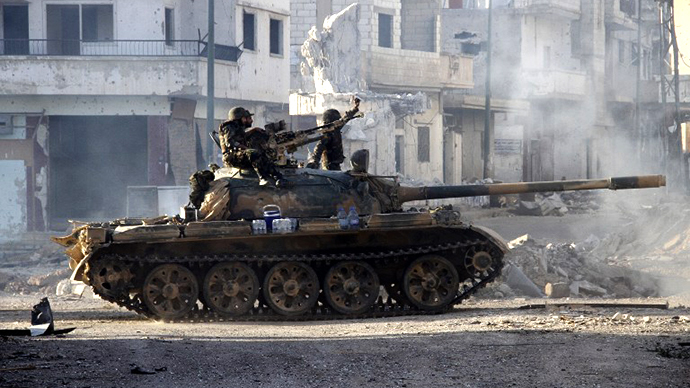Syria chemical weapons accusations ‘a means of justifying further military action’

The ‘red line’ drawn by the US over chemical weapons usage is a standard not applied to Syrian rebels, despite the same ‘red line’ being used for the Syrian government, Abayomi Azikwe, editor of the pan-African news wire, tells RT.
The US is conveniently ignoring accusations that the Syrian
rebels themselves might have engaged in crimes against humanity,
while throwing blame at Syria for unproven chemical weapon use to
justify further military, political and diplomatic pressure
against the Syrian government.
RT:American and EU intelligence agencies have reportedly
concluded that the Syrian government has used chemical weapons
over the last few years. Obama is on record saying that the use
of poison gas is a red line that would potentially trigger an
intervention in the conflict. Do you think these claims are
trustworthy?
Abayomi Azikwe: I think we need to see the evidence – this
is a so-called red line that President Obama drew several months
ago. He claims that if there’s evidence of the movement of
chemical weapons or the usage of chemical weapons, this would
require the United States to escalate its military intervention
into Syria.
Based upon the developments that have been taking place in Syria
over the last two weeks in regard to the removal of rebels from
various parts of the country and also the international
situation, which is very disadvantageous in relationship to any
type of US or NATO intervention in Syria – direct intervention in
Syria – I believe that this of course is being utilized to
provide a rationale and a justification for the escalation of
military, political as well as diplomatic pressure against the
Syrian government.
It’s no strange phenomenon that this is taking place right in the
aftermath of the routing of the rebels in the Al Kussur just over
a week ago. And of course these developments on the ground,
inside Syria do not bode well for US interests which are
exclusively designed to bring about the downfall of the
government of President Bashar al-Assad. I think we really need
to find out what concrete evidence they have that they Syrian
government is involved in the utilization of chemical weapons –
the Syrian government, it would definitely not be in their
interests to utilize chemical weapons in a situation where they
in fact have the upper hand against these Western-backed
rebels.

RT:Former chief UN War Crimes Prosecutor Carla Del Ponte said that in the latest report,
there are strong suspicions that sarin gas has been used by the
rebels and not the country’s authorities. What evidence does
Washington have to the contrary, do you think?
AA: Well, this is very interesting – the fact that this UN
investigator is claiming that there is evidence that would
suggest that the Western-backed opposition forces have been using
sarin gas – we don’t hear hardly anything in this regard as it
relates to the US State Department, the Department of Defense, or
the White House.
So why all of a sudden now that the Syrian government is being
accused of using chemical weapons, when in fact there is evidence
that would suggest that other forces in the opposition which are
indirectly are being armed, financed and given political support
by the West through their various proxy entities in the region?
In the gulf states vis-à-vis Turkey, Jordan, and also certain
elements in Lebanon. It’s quite obvious and this has even been
written about in the Western press, that they are indirectly
supporting and arming these counter-revolutionaries in Syria.
So they won’t take into consideration any human rights
violations, any crimes against humanity that are being committed
by the opposition forces. But any opportunity, whether it is
justified or whether it’s a complete fabrication, that they can
blame the Syrian government for committing crimes, they
immediately move in that direction as a means of justifying
further military action.
They have wanted for some time to declare that they will openly
arm the Syrian opposition, but they are doing it anyway. Now, it
would be very problematic for them to declare a no-fly-zone over
Syria and engage in airstrikes over Damascus and Aleppo and other
cities throughout the country because they have the support
of other countries that have said they will not allow the US or
UN to carry out bombing operations over Syria. So they have been
utilizing the Israeli Air Force, they’ve been utilizing other
proxy forces in order to carry out military actions against
Syria.
I think this is representative of the dilemma that the US is
facing and the European countries that are against Syria and we
just have to follow the situation very closely. I know that most
people inside the US and most people in the international
community do not want another war – a full-fledged war that will
involve our ground troops and even aerial bombardments against
the people of Syria. It would cause regional implications – the
southern Lebanese people would of course be involved in this
situation, Iran would be directly affected by it, as well as
Russia and other countries throughout the region.
The statements, views and opinions expressed in this column are solely those of the author and do not necessarily represent those of RT.












